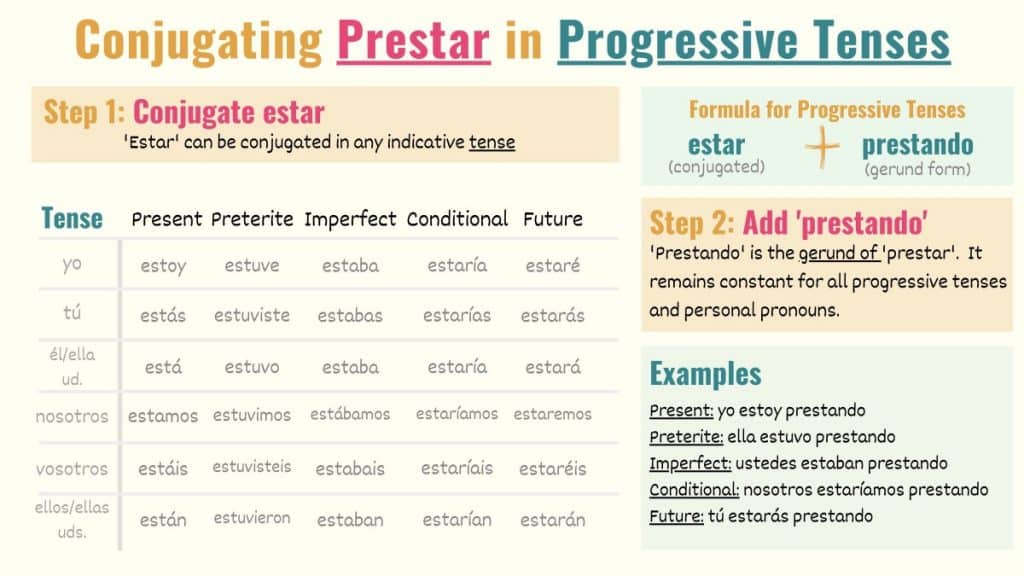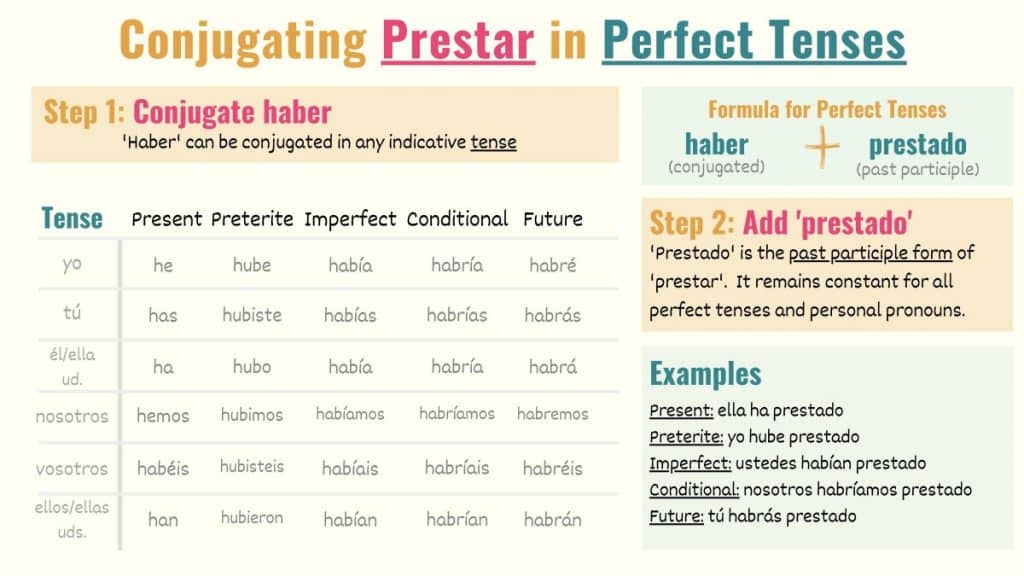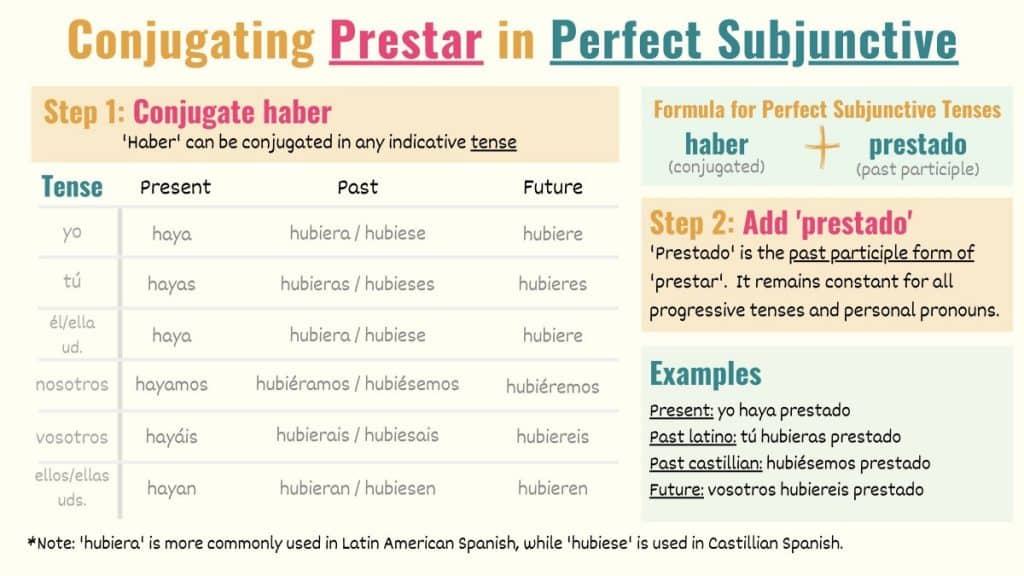In this short guide, we will cover the following topics for ‘prestar’ in Spanish:
- What does ‘Prestar’ mean?
- ‘Prestar’ Conjugations
- How to Use ‘Prestar’ in Spanish
- Expressions & Idioms with ‘Prestar’
- Synonyms of ‘Prestar’ in Spanish
What does ‘Prestar’ mean?
In Spanish, ‘prestar’ describes the action of giving someone something, expecting them to return it within a certain period of time. Therefore, this verb means ‘to lend’ or ‘to loan’. In other contexts, it can be translated as ‘to provide’, ‘to take part in’ or ‘to lend itself to’.
- When talking about giving something that will be returned after, ‘prestar’ means ‘to lend’ or ‘to borrow’.
- To indicate that someone is showing disposition to a certain situation, ‘prestar’ means ‘to take part in’.
- When explaining the response that something generated, ‘prestar’ translates as ‘to be open to’ or ‘to lend itself to’.
- To describe that something is good for a particular purpose or use, it can also be translated as ‘to lend itself to’.
‘Prestar’ Conjugations
‘Prestar’ is a regular verb, so the stem that you’ll use is ‘prest’, except for the future and conditional tenses, where you will use the infinitive verb followed by the proper endings.
Indicative
Present tense conjugation
| Person | Conjugation | Translation |
|---|---|---|
| Yo | Presto | I lend |
| Tú | Prestas | You lend |
| Él / Ella / Usted | Presta | He/She lends |
| Nosotros | Prestamos | We lend |
| Vosotros | Prestáis | You lend |
| Ustedes / Ellos / Ellas | Prestan | They/You lend |
Preterite tense conjugation
| Person | Conjugation | Translation |
|---|---|---|
| Yo | Presté | I lent |
| Tú | Prestaste | You lent |
| Él / Ella / Usted | Prestó | He/She lent |
| Nosotros | Prestamos | We lent |
| Vosotros | Prestasteis | You lent |
| Ustedes / Ellos / Ellas | Prestaron | They/You lent |
Imperfect tense conjugation
| Person | Conjugation | Translation |
|---|---|---|
| Yo | Prestaba | I lent |
| Tú | Prestabas | You lent |
| Él / Ella / Usted | Prestaba | He/She lent |
| Nosotros | Prestábamos | We lent |
| Vosotros | Prestabais | You lent |
| Ustedes / Ellos / Ellas | Prestaban | They/You lent |
Future tense conjugation
| Person | Conjugation | Translation |
|---|---|---|
| Yo | Prestaré | I will lend |
| Tú | Prestarás | You will lend |
| Él / Ella / Usted | Prestará | He/She will lend |
| Nosotros | Prestaremos | We will lend |
| Vosotros | Prestaréis | You will lend |
| Ustedes / Ellos / Ellas | Prestarán | They/You will lend |
Conditional tense conjugation
| Person | Conjugation | Translation |
|---|---|---|
| Yo | Prestaría | I would lend |
| Tú | Prestarías | You would lend |
| Él / Ella / Usted | Prestaría | He/She would lend |
| Nosotros | Prestaríamos | We would lend |
| Vosotros | Prestaríais | You would lend |
| Ustedes / Ellos / Ellas | Prestarían | They/You would lend |
Progressive Tenses

Mi prima me estuvo prestando su computadora el mes pasado.
My cousin was lending me her computer last month.
La escuela está prestando libros a los estudiantes.
The school is loaning books to students.
Perfect Tenses

Mi hermana nunca me ha prestado su vestido favorito.
My sister has never lent me her favorite dress.
Últimamente, los comentarios del presidente se han prestado a críticas.
Lately, the president’s comments have been open to criticism.
Prestar Subjunctive Conjugations
Present subjunctive conjugation
| Person | Conjugation | Translation |
|---|---|---|
| Yo | Preste | To lend |
| Tú | Prestes | To lend |
| Él / Ella / Usted | Preste | To lend |
| Nosotros | Prestemos | To lend |
| Vosotros | Prestéis | To lend |
| Ustedes / Ellos / Ellas | Presten | To lend |
Imperfect subjunctive conjugations
| Person | Conjugation | Translation |
|---|---|---|
| Yo | Prestara / Prestase | I lent |
| Tú | Prestaras / Prestases | You lent |
| Él / Ella / Usted | Prestara / Prestase | He/She lent |
| Nosotros | Prestáramos / Prestásemos | We lent |
| Vosotros | Prestarais / Prestaseis | You lent |
| Ustedes / Ellos / Ellas | Prestaran / Prestasen | They/You lent |
Perfect subjunctive

Te hubiera prestado mi celular, ¿por qué no me lo pediste?
I would have lent you my cell phone, why didn’t you ask me?
Si me hubieran prestado unos guantes, no habría tenido que comprarlos.
If they had loaned me some gloves, I wouldn’t have had to buy them.
Imperative
Imperative conjugation
Don’t forget that the negative imperative follows the subjunctive conjugation, preceded by the word ‘no’.
| Person | Conjugation | Translation |
|---|---|---|
| Tú | Presta | Lend |
| Nosotros | Prestemos | Let’s lend |
| Vosotros | Prestad | Lend |
| Ustedes | Presten | Lend |
[‘Prestar’ conjugated] + [indirect object pronoun] + [noun]
Préstale los audífonos a tu hermano.
Lend your brother the headphones.
Por favor, préstame tu lápiz un minuto.
Please, lend me your pencil for a minute.
[indirect object pronoun] + [‘prestar’ conjugated] + [noun]
No le prestes dinero a tu amigo.
Don’t lend money to your friend.
Niños, no le presten mi celular a sus primos.
Kids, don’t lend my phone to your cousins.
How to Use ‘Prestar’ in Spanish with Examples
In Spanish, ‘prestar’ is mostly used as a verb related to giving and returning things, but it also has other connotations. Its four main uses are:
- To talk about lending things
- To indicate disposition
- To describe other people’s reaction to something
- To describe that something is suited for a purpose
I’ll provide some examples and explain how to make the sentences through phrase structures so that you’re able to create them on your own.
To talk about lending things
In Spanish, we use prestar when describing that a person gave something to someone else and he or she is expected to return it. So in this context, ‘prestar’ means ‘to lend’ or ‘to loan’.
However, it’s important to understand that in this situation ‘prestar’ includes two meanings. One, when someone is lending something and the second to describe that someone is getting things with the intention of giving them back. As a result, when talking about the latter it is translated as ‘to borrow’.
[Indirect object pronoun] + [‘prestar’ conjugated]
¿Me prestas tu paraguas?
Can I borrow your umbrella?
¿Trajiste el abrigo que te presté?
Did you bring the coat I lent you?
Mañana te regreso el libro que me prestaste.
Tomorrow I’ll bring the book you lent me.
If you want to talk about giving something, even if the intention is not that it will be returned, you can also use the verb ‘prestar’, which, in this context, means ‘to provide’ or ‘to give’. This use is often applied when talking about immaterial things. Notice that you can also talk about paying attention because in Spanish, attention is conceived as something you give.
(Noun) + [‘prestar’ conjugated] + [noun]
Los paramédicos prestaron ayuda.
Paramedics provided help.
El sábado prestaremos nuestros servicios.
On Saturday we will provide our services.
Los estudiantes nunca prestan atención.
Students never pay attention.
Lucía, ¿me prestas una hoja?
Lucía, can you lend me a piece of paper?
To indicate disposition, involvement or participation
‘Prestar’ can also be translated as ‘to take part in’ or ‘to accept’ when talking about a person that accepts being involved in a certain situation or to do something. In this case, ‘prestar’ is used as a reflexive verb which means that conjugation will include a reflexive pronoun.
[Reflexive pronoun] + [‘prestar’ conjugated] + a + [noun]
Yo no me presto a chantajes de nadie.
I don’t accept blackmail from anyone.
Juan siempre se presta a las ideas de su esposa.
Juan always takes part in his wife’s ideas.
Ellos a menudo se prestan a las imposiciones del maestro.
They often take part in the impositions of the teacher.
To describe other people’s reaction to something
Spanish speakers also use prestar to express the type of reaction or answer that a person’s behavior, actions or decisions caused in someone else. So, in this case, this verb means ‘to lend itself to’ or ‘to be open to’.
[Reflexive pronoun] + [‘prestar’ conjugated] + a + [noun]
Sus acciones se prestaron a burlas.
His actions lend themselves to mockery.
Su amistad se prestó a muchos rumores.
Their friendship lent itself to many rumors.
Lo que dijo se prestó a varias interpretaciones.
What she said was open to various interpretations.
To describe that something is suited for a purpose
In other contexts, we also use the verb ‘prestar’ to talk about the fact that something or someone is convenient or suitable for a specific goal. With this meaning, ‘prestar’ can be translated as ‘to lend itself to’.
Se + [‘prestar’ conjugated] + para + [verb in infinitive form]
Esta canción se presta para ser un sencillo.
This song lends itself to being a single.
Mis botas no se prestan para andar en la nieve.
My boots don’t lend themselves to walk on snow.
La bicicleta que compré se presta para hacer ejercicio.
The bike I bought lends itself to exercise.
Related Resource: 7 Ways to Use ‘Se’ in Spanish
Prestar Expressions & Idioms
Here are a couple of expressions containing the verb ‘prestar’ that will help your conversational skills:
Prestarle importancia is used to describe that someone cares about something. It can be translated as ‘to attach importance to’ or ‘to pay attention to’.
Prestar oídos sordos directly translates as ‘to lend deaf ears’. It means that someone is not paying attention to what you’re saying and they’re just pretending to.
Synonyms of ‘Prestar’ in Spanish
Fiar describes the action of selling something to a person and giving them the chance to pay later. In other contexts, this verb is also used to talk about trusting a person. Depending on the context, ‘fiar’ is close in meaning to ‘to sell on credit’ or ‘to trust’.
Dejar is the direct translation of ‘to leave’. However, in Castilian Spanish, ‘dejar’ can also be used to express that a person is lending something to someone. So if used as an informal synonym of ‘prestar’, ‘dejar’ can be translated as ‘to lend’.

